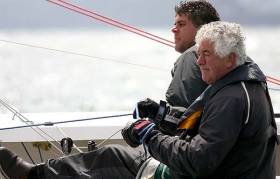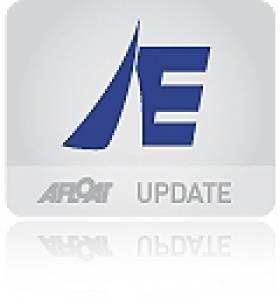Displaying items by tag: Richard Burrows
Ireland Represented At Etchells Worlds and Europeans in Cowes
Ireland will be well represented across the fleet at the Etchells European Championships that starts in Cowes today.
The Etchells 22 Class is, by many, regarded as one of the most competitive one design keelboat classes left now that there is no longer an Olympic Keelboat class.
The 2016 Worlds are scheduled for Cowes, Isle of Wight from the 5th to the 12th of Sept and will have 61 top level entries. Prior to that, in the same venue, will be the Etchells 22 European Championships, over today and tomorrow, which will is an unofficial warm–up event for the worlds.
Irish Interest in these events will be Malahide Yacht Club's Richard Burrows who is sailing Bedrock, with his daughter Samantha and local top sailor James Downer from Cowes. Royal Cork Yacht Club's Mark Mansfield, a four times Olympian in the Star Class, fresh from Success at the Irish IRC champs, Round Ireland Race, and European IRC Champs will sail as tactician on Andrew Coopers’ Ice. Mansfield has already Competed in the Quarter Ton Worlds in Cowes this year where he finished sixth and a fortnight ago won Cowes week in the Etchells 22 class aboard Coopers’ Ice.
Also racing in Cowes is Doris, skippered by Jay Bourke of Dun Laoghaire. Paddy Dillon (ex–Mermaid National Champion), Ruairi Grimes (third at recent J111 Worlds), Cathal Leigh Doyle (a former UCD Student Worlds Champion) and Morgan Reeser (American 470 Olympian married to 1996 Olympian Louise Cole) are also competing. Maurice O'Connell is coaching USA 1000 and USA 1404.
The Etchells Class is the choice of Many top Americas Cup and Olympic sailors and some top sailors competing this year include John Bertrand, Lawrie Smith, Steve Benjamin, Andy Beadsworth, Ante Razmiloviz, Chris Larson, Jud Smith, Jeff Madrigal, Luis Dopreste.
Reigning Champion is Skip Diebal from the USA and he will have his work cut out for him with such a competitive fleet, the majority of whom come from the USA, UK, Australia, and Hong Kong.
#etchells – An eighth scored in race four of the Etchells World Championships has moved sole Irish boat, Bedrock sailed by Richard, David and Samantha Burrows, up to 27th overall in New York. Overall results are here
Bill Hardesty's resilience has brought him and his crew of Taylor Canfield, Stephanie Roble and Marcus Eagan to the top of the leader board despite a heavy downpour and fluky winds on the third day of the 2014 Etchells Worlds, hosted by the New York Yacht Club at Harbour Court in association with Sail Newport.
After a two-hour postponement on shore followed by another two hours on the water, storm clouds gathered, the wind velocity increased and the wind direction settled down enough to allow Race 5 to start. Shortly after that, the rain began, so forceful at times the weather mark was obscured. Those who sailed to the right, toward the squall, faired better and rounded the weather mark in the lead, albeit a bit wetter for their efforts. The wind shifted left throughout the race dropping slightly in velocity. Senet Bischoff and Ben Kinney won Race 5 by a healthy margin with Hardesty finishing fourth, giving him a 9-point lead over Hank Lammens, who finished 16th in today's race. Marvin Beckman sits in third overall followed by John Bertrand in fourth and Ante Razmilovic rounding out the top 5.
Today's start time has by moved up one hour tomorrow to maximize what is expected to be a dying northerly breeze. After six races have been completed, each team will be able to discard their worst finish.
The 2014 Etchells Worlds will continue until tomorrow Saturday.
#etchells – Ireland has a single entry in a 95–boat fleet for the 2014 Etchells keelboat World Championship from June 21 to 28 in New York. The class's 46th world championship will be one of the biggest and most competitive in its celebrated history.
Malahide and Howth Yacht Club sailing family trio, Richard, David (a four time Olympian) and Samantha Burrows are entered in the Corinthian, Masters and Seniors divisions in a fleet that has already attracted some of the world's top professional and amateur sailors.
Long Island Sound yacht designer and builder Skip Etchells created the 31-foot keelboat in 1965 hoping to win selection as the new Olympic keelboat.
The design dominated the racing in the selection trials, but lost in the onshore voting for Olympic status. For the 2016 Olympics, there will be no keelboat sailed in the Olympic regatta.
But nearly 50 years after the first Etchells touched the water, the class is as strong as ever.
The number of entries in recent class world championships has varied from 41 last year to a high of 100 in 1998.
Up to nine races are scheduled, all but one of which will count toward a team's final score. Registration and measurement for the regatta will start on Saturday, June 21, with the racing taking place on Rhode Island Sound, Tuesday, June 24, through Saturday, June 28.
For an entry list click here.
#etchells – There's not much interest in recruiting women into the Etchell's class as it prepares for the world championships in Rosignano Solvay, Italy this week if the response to an Irish 'bio break' query is anything to go by.
There was a howl of resistance – mainly Australian in origin – against any special provision for women when Irish skipper Richard Burrows from Howth asked about mother ship facilities for his female crew at this weekend's pre-world Italian championship.
Burrows is sailing with son David and daughter Samantha at this week's Italian championships and next week's worlds at the same venue.
"Bucket and chuck it" appears to be the mantra. Easy for some!
There will be no facility in high temperature and long days on the water. Is this the way forward at an international world championships or should regatta organisers make such a provision?
Or is it a wider issue where it appears class traditionalists would probably prefer if women were not taken as crew in the class?
A glance at the entry list so far shows the Howth trio is one of only two mixed crews in the entire line up.
The regatta site proudly boasts this Italian venue is the 'first Etchells Worlds to be held in a non–Anglo Saxon country'.
It's great to see the venerable class charting new waters but perhaps a more considerate approach to the fairer sex might also help in the drive to boost numbers?
Whither Irish Sailing? – Richard Burrows
#sailing – Former Irish Olympic Sailing Chief Richard Burrows has been following the debate on the future for Irish sailing and suggests the focus should be on recruiting the next generation of sailors. Writing today (as a grandfather), the 1986 Round Ireland race winner and former champion dinghy sailor is concerned that the proper fabric for training youngsters is in place.
I have followed the debate following on from the ISA meeting through the excellent facility of your Afloat updates.
The input from Roger Bannon contains much which I instinctively agree with but I do recognise that as far as young sailors are concerned I am very much out of date. However as a grandfather I look forward to introducing a new generation to sailing and I am concerned that the proper fabric for training, encouraging, and motivating youngsters is in place.
Clubs bear responsibility for this. And club members must play an active role. Junior sailing is not a babysitting service that can be outsourced to the ISA. An example of this being done well is to be found at Malahide Yacht Club. There, it comes down to active leaders on committee, great officers, and reasonable pricing. Choices about which boat are immaterial so long as the boats are safe, easily sailed, and cheap.
Roger makes some polemic comments about High Performance sailing and the funds devoted to this aspect of the sport. He won't mind me reminding him that he was in the Presidents chair when the foundation of today's policy was put in place with his full support. He is right that Olympic medals have proven to be elusive but this is just a matter of time.
At Weymouth two competitors were potential medal winners but it wasn't to be. Would this debate be taking place if medals had been won?
Yes, in my view, the two aspects of the sport are only connected by the fact that high performance sailing attracts publicity, and thus awareness of sailing. Club sailing will not produce column inches. And, spreading the funds devoted to support high performance sailing into club activities would not move the needle as the club base is so large.
So, my suggestion is to focus the debate on recruiting the next generation of sailors. And that means club members getting involved at club level. If ISA instructors are not up to it don't employ them. Charge nominal subscriptions to members under the age of 25. Embrace all forms of sailing including boards and kites. The responsibility lies with clubs. We cannot allow nanny state thinking to pervade and render clubs moribund in the expectation that the ISA will save them.































































